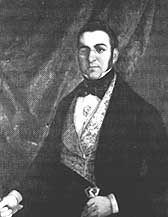
Manuel Bretón de los Herreros
Encyclopedia

Quel
Quel may refer to:* QUEL query languages, a relational database access language* Quel, La Rioja, a municipality in La Rioja, Spain...
(Logrono) – November 8, 1873, Madrid
Madrid
Madrid is the capital and largest city of Spain. The population of the city is roughly 3.3 million and the entire population of the Madrid metropolitan area is calculated to be 6.271 million. It is the third largest city in the European Union, after London and Berlin, and its metropolitan...
) was a Spanish dramatist, educated at Madrid. Enlisting on 24 May 1812, he served against the French
France
The French Republic , The French Republic , The French Republic , (commonly known as France , is a unitary semi-presidential republic in Western Europe with several overseas territories and islands located on other continents and in the Indian, Pacific, and Atlantic oceans. Metropolitan France...
in Valencia and Catalonia
Catalonia
Catalonia is an autonomous community in northeastern Spain, with the official status of a "nationality" of Spain. Catalonia comprises four provinces: Barcelona, Girona, Lleida, and Tarragona. Its capital and largest city is Barcelona. Catalonia covers an area of 32,114 km² and has an...
, and retired with the rank of corporal on 8 March 1822. He obtained a minor post in the civil service under the liberal government, and on his discharge determined to earn his living by writing for the stage.
His first piece, A la vejez viruelas, was produced on 4 October 1824, and proved the writer to be the legitimate successor of the younger Moratín
Leandro Fernández de Moratín
Leandro Fernández de Moratín was a Spanish dramatist, translator and neoclassical poet.-Biography:Moratín was born in Madrid the son of Nicolás Fernández de Moratín, a major literary reformer in Spain from 1762 until his death in 1780.Distrusting the teaching offered in Spain's universities at...
. His industry was astonishing: between October 1824 and November 1828, he composed thirty-nine plays, six of them original, the rest being translations or recasts of classic masterpieces. In 1831 he published a translation of Tibullus
Tibullus
Albius Tibullus was a Latin poet and writer of elegies.Little is known about his life. His first and second books of poetry are extant; many other texts attributed to Tibullus are of questionable origins. There are only a few references to him in later writers and a short Life of doubtful authority...
, and acquired by it an unmerited reputation for scholarship which secured for him an appointment as sub-librarian at the national library. But the theatre claimed him for its own, and with the exception of Elena and a few other pieces in the fashionable romantic vein, his plays were a long series of successes. His only serious check occurred in 1840; the formerly more liberal government had grown conservative, and when in La Ponchada the author ridiculed the National Guard, exception was taken in high circles.
He was dismissed from the national library, and for a short time was so unpopular that he seriously thought of emigrating to America
United States
The United States of America is a federal constitutional republic comprising fifty states and a federal district...
; but the storm blew over, and within two years Bretón de los Herreros had regained his supremacy on the stage. He became secretary to the Spanish Academy, quarrelled with his fellow-members, and died at Madrid. He is the author of some 360 original plays, twenty-three of which are in prose. No Spanish dramatist of the nineteenth century approaches him in comic power, in festive invention, and in the humorous presentation of character, while his metrical dexterity is unique. Marcela, o ¿a cuál de los tres? (1831), Muérete y verás! (1837) and La Escuela del matrimonio (1852) still hold the stage, and are likely to hold it so long as Spanish is spoken.
Selected works
- A la vejez, viruelas (1824) (In Old Age, Chickenpox)
- Marcela o ¿Cuál de las tres? (1831)
- Muérete y verás (1837)
- La escuela del matrimonio (1852)

